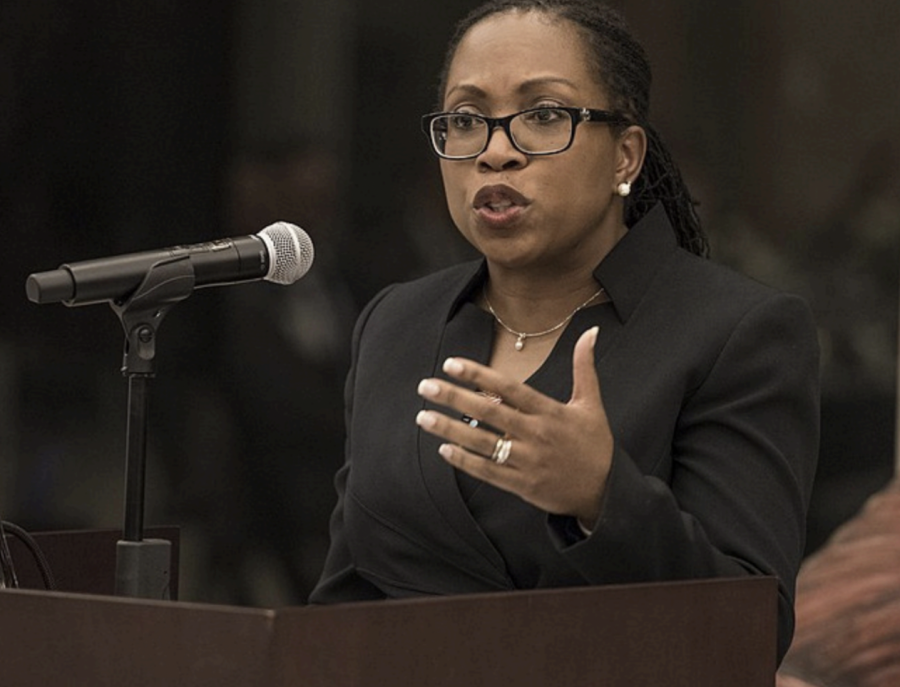Biden Nominates Ketanji Brown Jackson for Supreme Court
Biden nominated Ketanji Brown Jackson to replace Justice Stephen Breyer. She is currently amidst confirmation hearings among the Senate, facing questioning on past judicial decisions.
March 28, 2022
On Feb. 25, President Joe Biden appointed Ketjani Brown Jackson as a nominee for the United States Supreme Court. President Biden began searching for new qualified justice candidates when Justice Stephen Bryer’s intention to retire from the court was reported on Jan. 26 by a myriad of news websites.
Ketjani Brown Jackson was born in Washington, D.C, but raised in Miami, Florida. She was accepted into Harvard, where she received both her undergraduate degree and law degree. At Harvard, she was an editor on the Harvard Law Review, a student run organization that publishes a journal on legal scholarship.
She began her legal career with three clerkships, including one with Justice Breyer, who she is expected to take place of in the Supreme Court. She served for the United States District Court for the District of Columbia as a district judge for nine years. For four years, she was the vice chair of the U.S Sentencing Commission, and the Harvard Board of Overseers for nearly six years.
Kelsi Corkran, a law professor at Georgetown University and previous clerk for the late Justice Ruth Bader Ginsberg, comments on Judge Jackson’s extensive background and experience with the study of law.
“She is incredibly qualified to serve on the Supreme Court. In addition to her many years as a district court judge, she previously served as a public defender, representing indigent criminal defendants. None of the other Justices have done criminal defense litigation, so this background will help her bring an important new perspective to the Supreme Court,” says Corkran.
Additionally, those in the Benjamin community agree with Corkan and believe that Judge Jackson is fit to sit in the Supreme Court.
“I believe Judge Ketanji Brown Jackson is a qualified nominee based on her education and career accomplishments. The Constitution actually requires the least qualifications for the Supreme Court in contrast to the other two branches of government, so credentials tend to be compared to the other Justices. I think that Judge Jackson’s qualifications are on the same level as her new colleagues,” says social studies teacher Ms. Alexandra Murray, who attended Harvard as an undergraduate and is applying to several prestigious law schools.
Judge Jackson received an endorsement from 59 previous Justice Department officials for her Supreme Court nomination. The Justice Department officials “urge the confirmation” of Judge Jackson in a letter written on March 9 and sent to Senate leaders. These officials stated Judge Jackson had an impressive background of academic credentials and is highly experienced in the study and practice of law. They believed she would be a fitting replacement for Justice Breyer, who was known for his pragmatism.
“Judge Jackson is relatively similar ideologically to Judge Breyer, which makes sense. Though the Supreme Court is meant to be apolitical, the differing beliefs of each justice play a factor in their appointment. In the last couple of years, we have seen the appointment of two conservative justices in replacement of two liberal judges which swings the court slightly to the right. I think that maintaining a balance of perspective and representing the views of the American public are integral to the success of the Supreme Court as one of our 3 branches of government,” says Ms. Murray.
Judge Jackson has already met with senators on Capitol Hill, as well as spoken to Senators Joe Manchin and Susan Collins, whose votes for her may be crucial for her official induction. They both seemed to have formed approving opinions of her. Manchin called her a “very accomplished person” with a “very credible record”, and Collins noted that “her credentials and breadth of her knowledge are impressive”.
Judge Jackson will attend hearings that begin March 21. In order to be inducted, she will need the vote of 50 senators to be officially confirmed. With liberal rulings in the past, the Senate seems to be in her favor with 50 Democratic senators and the Democratic Vice President Kamala Harris’ tie-breaking vote.
Corkran commends Judge Jackson for her ruling in a notable case in the lower courts in the past, noting her fairness and integrity.
“The government seized $180,000 worth of heroin from a drug dealer, and then attempted to seize an additional $180,000 from him as the amount he benefited from the crime. Judge Jackson held that the government could not seize another $180,000 after it already took the heroin, because that was ‘impermissible double-counting,’” said Corkran.
The outcome of March 21’s voting will determine whether Judge Jackson will become the first black woman to serve as a justice on the Supreme Court. Senate members and others appear to have formed approving opinions of her that recognize her for her background in law and notable qualities.



